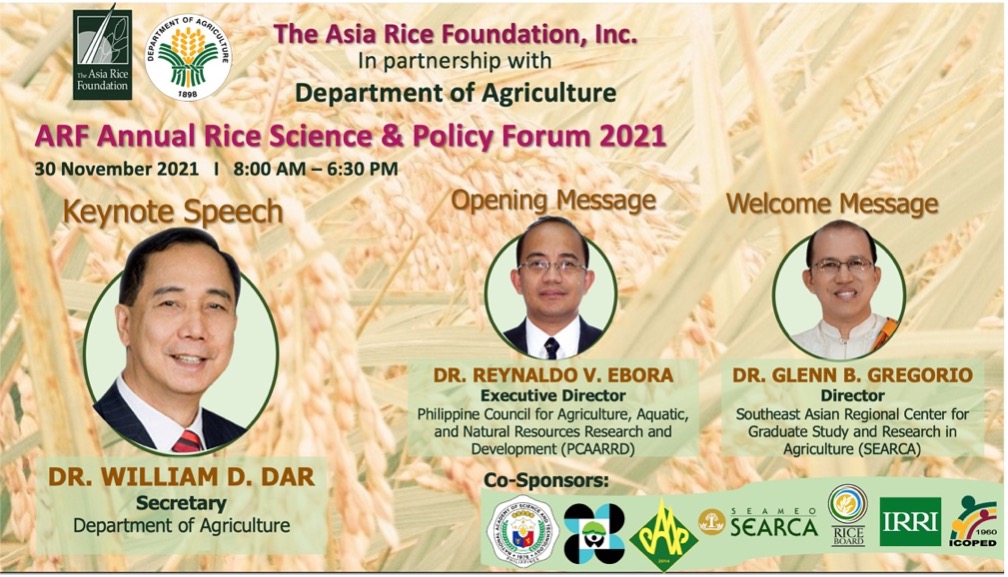
The Philippine Council for Agriculture, Aquatic and Natural Resources Research and Development of the Department of Science and Technology (DOST-PCAARRD) joined the Asia Rice Foundation (ARF) in holding its Annual Rice Science and Policy Forum 2021 last November 30, 2021 via Zoom.
Themed, “Boosting Rice Yields and Farmers’ Income Through Soil Health Rejuvenation,” the one-day virtual forum gathered ideas and recommendations on how to improve yield and long-term soil fertility capacity for sustainable rice production, from integrated nutrient management experts. The event involved the presentation of the technology recommendations and proposed research and development areas on soil rejuvenation and integrated nutrient management.
Dr. Reynaldo V. Ebora, DOST-PCAARRD Executive Director and Dr. Glenn B. Gregorio, Southeast Asian Regional Center for Graduate Study and Research in Agriculture (SEARCA) Director delivered the opening messages.
In his message, Dr. Ebora pointed out some of PCAARRD’s ongoing projects related to soil health improvement such as the application of nuclear analytical techniques; use of crop simulation models in issuing advisories to farmers (SARAI Phase II); application of carrageenan plant growth promoter; FertiGroe® nitrogen (N), phosphorus (P) and potassium (K) nanofertilizers; use of multiple strains of plant growth promoting rhizobacteria-based biofertilizer for sustainable lowland rice production; and soil health management in support to agricultural recovery in selected areas in CALABARZON during the CoViD-19 Pandemic.
The conference was keynoted by Dr. William D. Dar, Department of Agriculture (DA) Secretary.
Plenary presentations were given by speakers from Bureau of Soils and Water Management (BSWM), International Crops Research Institute for the Semi-Arid Tropics (ICRISAT), DA-Regional Field Office 9 (DA-RFO 9), and Philippine Rice Research Institute (PhilRice). The presentations focused on the National Soil Health Program of the DA, India’s success on the Bhoochetana project on soil rejuvenation and its local adoption, adaptive balanced fertilization management, and integrated nutrient management practices in the country.
Dr. Salvador P. Catelo, ARF Executive Director, discussed and enumerated the policy implications and recommendations to boost rice yields and farmers’ income through soil health rejuvenation under the National Soil Health Program (NSHP). These include the following: 1) ensure adequate supply of fertilizer at reasonable prices; 2) enable farmers to gain more access to fertilizer; 3) induce higher and proper fertilizer application by farmers; 4) promote soil health assessment as primary entry point activity (EPA) in planning science-based and productivity-enhancing interventions in rice farming; 5) establish more Province-led Agriculture Fisheries Extension System (PAFES) initiatives; 6) revive training platforms and provide them adequate logistical support; 7) integrate the knowledge-generating institutions along with knowledge-transforming institutions, and 8) pursue an effective monitoring and evaluation system.
The plenary was followed by two panel discussions on integrated nutrient management (INM) and the implementation and scaling of INM in the country. These were participated in by UPLB, PhilRice, DA-Bureau of Agricultural Research (DA-BAR), ICRISAT, IRRI, and SIKAP/STRIVE Foundation.
National Scientist and ARF Vice-Chairman Dr. Emil Q. Javier concluded the event with the overall synthesis. He reiterated that soil and water are the foundations of agriculture and that soil becomes degraded gradually over time. Hence, through the NSHP, he hopes that soil as a resource can be rejuvenated and restored through intelligent management. He suggested further looking into the possibility of lodging the laboratories of the BSWM to strategically located state universities and colleges (SUCs) in relation to setting up the national network of soil laboratories to further ensure the effectiveness of the Program.
Through this conference, selected scientists, experts, and administrators of public and private agencies shared the results of their studies, experiences, and practices on INM. It drew recommendations from the experts that, if optimally scaled, may improve the yield and long-term soil fertility capability for sustainable rice production.
ARF intends to publish a book as an output of the forum to present the status of INM and practices to enhance better use of nutrient and fertilizer resources in the country, as well as, policy recommendations on scaling and implementing the practice of INM and related measures to sustain soil health.
The strategic partnership of DOST-PCAARRD with ARF supports the priorities and programs of the Council on crops and natural resources research agenda under the Harmonized National Research and Development Agenda (HNRDA) for the AANR sector (Christhaline A. Arellano, DOST-PCAARRD S&T Media Services).
